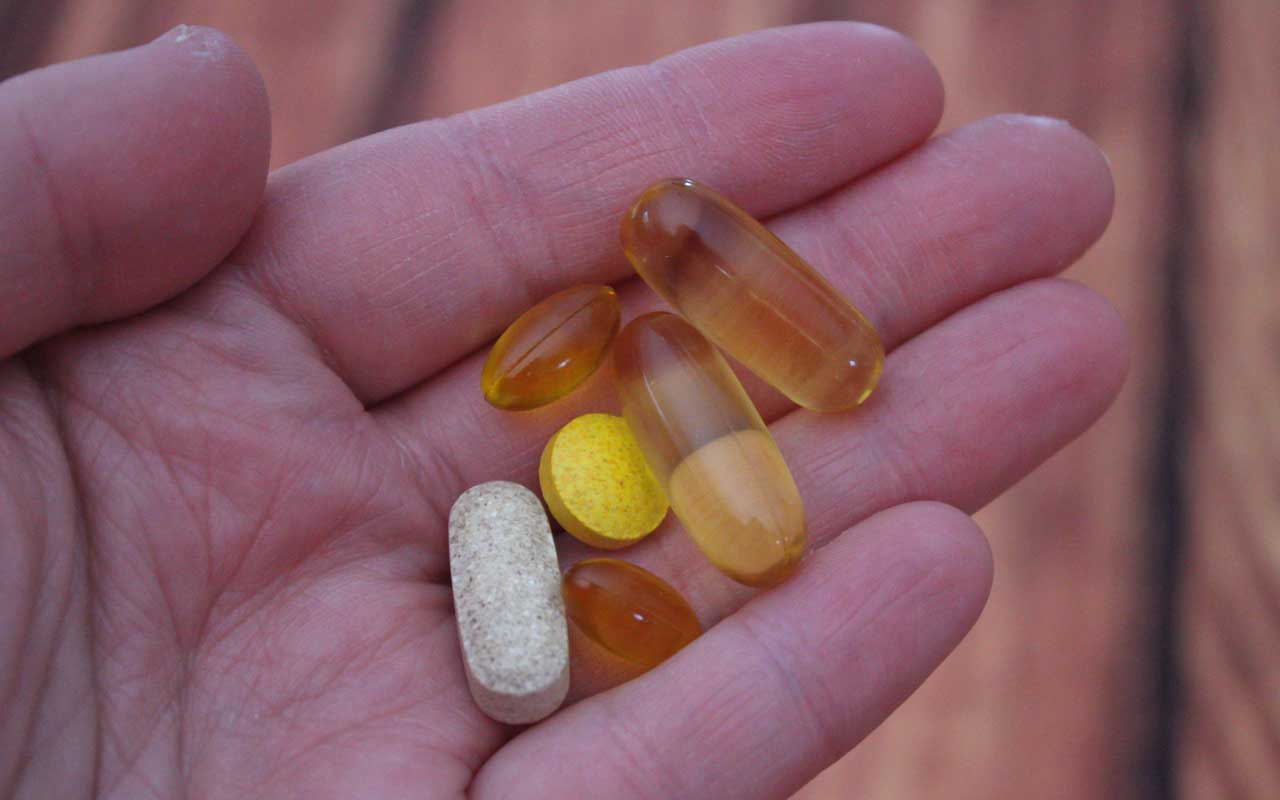Podcast: Download
Subscribe: Apple Podcasts | RSS
 Do you really need to take vitamins for memory improvement?
Do you really need to take vitamins for memory improvement?
For many people around the world, the answer is tragic.
Not only do they dump hundreds, if not thousands of dollars per year on the hope that pills in a pretty package will lead to a boost in memory is a common habit…
Sometimes they take vitamins that cause harmful interactions.
This happens especially to seniors who believe that it is essential to take nutritional supplements to combat against age related memory loss, brain fog.
It certainly can be, but you need the best possible vitamins to combat everyday forgetfulness and deter the onset of Alzheimer’s or dementia.
On this page, we’re going to look at a number of memory enhancing vitamins.
In many cases, you’ll be able to get what you need from food. But as we age, we often need supplementation. The trick is making sure we get the absolute best supplements matched with what we actually need.
As someone who has studied memory for a long time and who combats a number of health issues, I’ll also share the vitamin supplement pills that help me most with my own memory issues. As I age, they become more and more important for me to tackle correctly.
Ready for all of my best research findings and the vitamins I focus on above all? Let’s dive in!
7 Best Vitamins For Memory Improvement
As we go through this list of vitamins, keep in mind that vitamins are a group of organic compounds.
They are different from fats, carbohydrates and proteins, substances that nourish our body and are essential for our growth and functioning. We usually get them through the food we eat.
Vitamins are equally important to maintain brain health:
“In particular, research over the past 5 years has provided exciting evidence for the influence of dietary factors on specific molecular systems and mechanisms that maintain mental function.”
That’s from Dr. Fernando Gomez-Pinilla, a leading authority on nutrition and the brain at the University of California, Los Angeles in his research paper, Brain Foods: The Effects of Nutrients on Brain Function.
Now that we have a working definition of what vitamins are, let’s look at the essentials you need to keep your memory operating at its best.
One: Vitamin B12
B12 has been connected with cognitive impairment – something you definitely don’t want to suffer.
As this study demonstrates, people with normal levels of B12 were able to remember things much better than those who did not.
Shockingly, even having a small imbalance mean that people lacking proper B12 struggled to recall information correctly.
This raises an important point:
While we need vitamins only in small quantities, if any vitamin is absent from our diet, a deficiency disease may occur – a fact first noted by William Fletcher in 1905.
But here’s the kicker:
If you are already getting adequate B vitamins though your diet, getting extra through supplemental pills will not give you a memory boost.
Luckily, there are other foods that improve memory, many of which contain Vitamin B12.
Two: Vitamin D
When I started noticing my memory slipping while teaching university courses in Germany, I immediately followed the research showing that Vitamin D helps improve memory function.
Although it’s a memory supplement that comes in the form of a pill, I also make sure I get plenty of sunshine.
Exposure to sun for Vitamin D is especially critical during winter, as this scientific study has made clear.
Three: Vitamin E
This vitamin isn’t so much about boosting your memory.
Rather, studies like this one have shown that making sure you have enough Vitamin E is essential for reducing your chances of developing dementia later in life.
Four: Vitamin C
Want an immediate memory boost?
This study shows that people who take it not only enjoy better memory quickly. They also enjoy improved visuospatial and language skills.
Researchers speculate that these benefits might come from how Vitamin C improves your cerebrospinal fluid.
Five: Vitamin B6
Although Vitamin B6 is not directly tied to memory in this study, it has been shown to slow the degradation of the brain.
Having enough of it can also help regulate anxiety, as discussed in this study.
Make no mistake. Anxiety can affect your memory, so it’s important that your B6 is in order.
Six: Vitamin K2
Scientists previously thought that K2 was mostly about bone and cardiovascular health.
Now, as this report discusses, researchers believe K2 is of holistic importance to all aspects of your health.
The catch might be that K2 is often taken by humans through dairy. Personally, when I eat dairy, I experience brain fog.
Frankly, it’s worth a little bit of unclear mental capacity a few times a week for the greater good of my brain health. But each person has to make these decisions on their own – ideally with guidance and insight from a doctor.
Seven: Vitamin A
The interesting thing about Vitamin A is that it helps learning and how you behave.
As this study suggests, in order to learn properly, we need Vitamin A both during development and as adults to keep learning new things, especially skills.
Can Multivitamins Boost Memory?
The answer is yes, but there’s a caveat.
As this study has found, many people experience placebo rather than genuine improvements.
Marketers know this, which is why vitamins for memory improvement has become such a vast industry.
In the United States alone, annual sales of all multivitamin and mineral containing supplements totalled $14.3 billion in 2014.
Since the 1940s, Americans have been taking multivitamin and mineral supplements.
But get this:
To date, there has been no concrete study to substantiate that popping vitamin supplements has improved people’s health or their memory more than what can be achieved by a healthy diet and exercise.
Interestingly, although more than one-third of all Americans take these supplements, they have no standard scientific, regulatory, or marketplace definitions.
Why does this matter?
Manufacturers decide the types and levels of vitamins, minerals, and other ingredients in their supplements based on factors that are not always guided by science or in your best interest.
How To Protect Yourself From False Claims
In a phrase:
Do your own research.
Fact-checking what people and companies claim about their “memory vitamins” is so important because many vitamin supplements, fish oil and herbs like ginkgo biloba are touted to improve memory, there is hardly any evidence to back up the claims.
A 2013 study in the Canadian Medical Association Journal found no evidence that drugs, herbal products or vitamin supplements (including vitamin B6 and omega-3 fatty acids – products thought to help brain function) helps prevent memory loss in healthy people.
In fact, the study revealed that certain treatments actually seemed to contribute to cognitive problems.
That’s completely the opposite of the goal!
Worse:
Healthy women who were given estrogen hormone treatment to improve memory actually suffered from higher memory loss over time, compared to subjects who were given placebos instead of actual memory enhancers.
Not only that, but get this:
Between 2008 and 2011, the FDA received 6,307 reports of health problems from dietary supplements, says a 2013 report from the Government Accountability Office (GAO).
That’s a lot of problems!
And the fact that people are trying to learn from their smartphones about health in our age of digital amnesia only makes matters worse.
Alternative Ways To Improve Brain Function and Memory
When it comes to brain vitamins for studying or memory enhancing drugs, nothing works better than a balanced diet, lots of hydration, an active lifestyle and at least 7 hours of sleep every night.
Easy isn’t it?
Well, hang on there, because it gets even better…
Foods like walnuts, green tea, blueberries, salmon are all super foods when it comes to protecting you from brain fog and memory loss.
The best part?
The Most Memory-Friendly Diet Known To Humanity
An easy-to-follow Mediterranean-style diet can have lasting benefits for brain health, confirmed a 2017 study. It showed that participants who closely followed a Mediterranean-like diet were less likely to lose brain volume as they aged, compared with those who didn’t follow such a diet.
Another study published in the journal Neurology suggests that a Mediterranean diet – rich in fruits, vegetables, whole grains, beans, potatoes, nuts, olive oil and fish – may help make your brain about five years younger.
Processed foods, fried and fast foods, snack foods, red meat, poultry and whole-fat dairy foods are usually eaten less under this diet plan.
Drinking water also helps to improve memory and focused attention. A new study revealed that if you are even slightly dehydrated, it can impair your attention and memory.
The other way to improve memory is to simply train and exercise your brain.
If you’d like more help with that, grab my free course here:
It gives you four video tutorials and worksheets that walk you through how to exercise your brain.
You still need to make sure you have all the right memory vitamins in your system.
But one that is covered, techniques like the Memory Palace that you’ll learn in this course will help you remember information quickly.
So what do you say?
Are you ready to vitalize your memory all around?
Power to you, one memory-friendly vitamin at a time!
Related Posts
- Memory Improvement Techniques For Kids
You're never too young to get started with memory techniques








6 Responses
Another great podcast, Anthony. I follow this diet for memory improvement:
The End of Alzheimer’s
It involves quite a lot of medical testing and seems to be an empirically proven approach. It’s a very interesting book.
Andrew.
Looks like a great book, Andrew. Thanks kindly for mentioning it and giving us all an opportunity to read it. I’m going to order it and give it a read. I really appreciate the tip! 🙂
Hello there!
I was thinking about complementing your good ideas.
Outdoor activities in the sun for at least 15 minutes in daylight. Helps in many ways it regulates the sleep cycle, it fights against mental health issues.
Also your skin produces vitamin D, which reduces risk of getting dementia/alzeimers. If you live close to polar areas, where autumn and winter means very weak sunlight, you make sure to complement with vitamin D3 to your outdoor daylight activities (which is still important for your minds health).
Greetings
Pelle Chamliden
Excellent additions, Pelle. Thanks for including them with this post – much appreciated! 🙂
Nice post, Anthony! Good thing I like all the superfoods you mention. Was thinking as I read this that something along the line of this post might be a good guest post for someone like Tim Ferriss. Don’t know if that interests you but I’ll throw it out there. 😉
That is a lovely compliment coming from one of the writers I admire the most, Leanne – thanks!
Now that you mention it, this probably would fit well on the 4 Hour Workweek blog. I was always thinking of tackling it from the angle of mnemonic-mechanics, but this information is just as critical and of interest to him and his audience.
Consider the mission accepted and thanks again for stopping by! 🙂